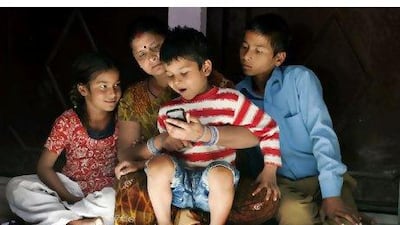NEW DELHI // Six-year-old Gagan Mishra knew just what to do when his front tooth fell out during playtime at school.
That morning while Gagan got dressed for school, he listened on to a children's radio programme broadcast over mobile phone into to the one-room flat that he shares with his brother, sister and parents.
The radio character, Boombah, sang about hygiene, including the importance of hand washing before and after meals. Or when they got dirty.
At school, after he lost his tooth, Gagan rinsed his mouth and washed his hands and face with soap. Then he buried his tooth in the playground.
"Boombah is the best. He is my friend," Gagan said.
Boombah is a shaggy lion muppet created for the subcontinent's children by Galli, Galli, Sim, Sim, the Hindi adaptation of the popular United States television series, Sesame Street.
The Indian version is accompanied by a radio version that teaches poor children about health and hygiene. The programme is accessible on any basic mobile phone with AM/FM capability.
Featuring the voice of popular Sesame Street characters, the programmes in the Hindi language are broadcast three times a week through a community radio station in Gurgaon.
Galli, Galli, Sim, Sim's programmes reach 9,000 children between 6 and 8 years of age, teaching them skills that their parents may not be able to impart. (Galli means street. Sim, sim are the Hindi words for "Open Sesame")
Gagan's father, Umesh Mishra, 36, first heard the programme on his mobile phone while he was out driving his auto rickshaw in Gurgaon. He knew instantly that his children would love it.
His wife was less sure. She was not convinced that the programme would benefit their children. After all, she had been telling them to wash their hands for years, with limited success. "But in the two months since we started listening, there has been a marked difference in their behaviour," Mrs Mishra said.
The children bathe before going to school. They brush their teeth. They comb their hair.
"When they refuse to wash their hands now, I ask them, 'what did the programme say?' Before they would not listen to me but now that someone else tells them to do it, they like it," Mrs Mishra said. "I am learning too."
Households like the Mishras are the target audience of Gurgaon Ki Awaaz (The voice of Gurgaon), a community radio station that reaches out to the many migrant families who have flocked to Gurgaon from around the country in search of a better life. They mostly work as semi-skilled and unskilled labour. An estimated 800,000 migrant workers are part of the population of 1.5 million residents.
During the past 25 years, Gurgaon has undergone a rapid transformation from a quiet village to an industrial centre hosting branches of major international and Indian financial, telecom and IT companies. It is now one of India's largest outsourcing hubs.
"We are not catering to call centre workers or the IT crowd," said Arti Jaiman, the station director of Gurgaon Ki Awaaz. "We are catering to their drivers."
When migrant workers move to the city, they are uprooted from their traditional cultural practices. Back in their villages, children often play in the river. That is their bath. Rubbish disposal meant burning waste or composting it to use in the fields. For hand washing, ash, containing lye, is used.
In the unfamiliar environs of the city, none of these traditional hygiene practices is available. "They don't know what to replace it with," Ms Jaiman said. "They need new structured instructions on how to cope."
A community reporter, Vandana, 20, who goes by her first name only, has hosted the show since the pilot was launched two years ago, and fields calls from parents and children.
One of her most memorable calls was from a child who did not know where to throw his rubbish. Vandana had to convince him to use a dust bin.
"They may see a dust bin but, at the same time, they do not see it because they don't know what it is for," Ms Vandana said.
"They do not know how to dispose waste properly in the city because they may not have had a dust bin in their village."
Two years ago, Gurgaon did not have programmes for children, said Sashwati Banerjee, managing director of Sesame Workshop Initiatives India in New Delhi. "We think radio works wonders in India. The children are learning, connecting and questioning. This cannot replace a classroom, but it helps them access some of that content."
At the Mishra household, Mrs Mishra chuckles over the memory of one particular broadcast. It was about how to resolve sibling rivalry. The programme encouraged children to share. She gave the children some potato chips and watched them with pride as they each took a piece and shared the snack.
"Gagan bothers me, but I don't fight with him anymore because the programme said I should not hit my little brother or sister," said Abhishek, 14, Gagan's older brother. "Now I have a way to distract him."
With that, Abhishek breaks into Gagan's favourite song - about brushing his teeth.
Follow
The National
on
& Surya Bhattacharya on

